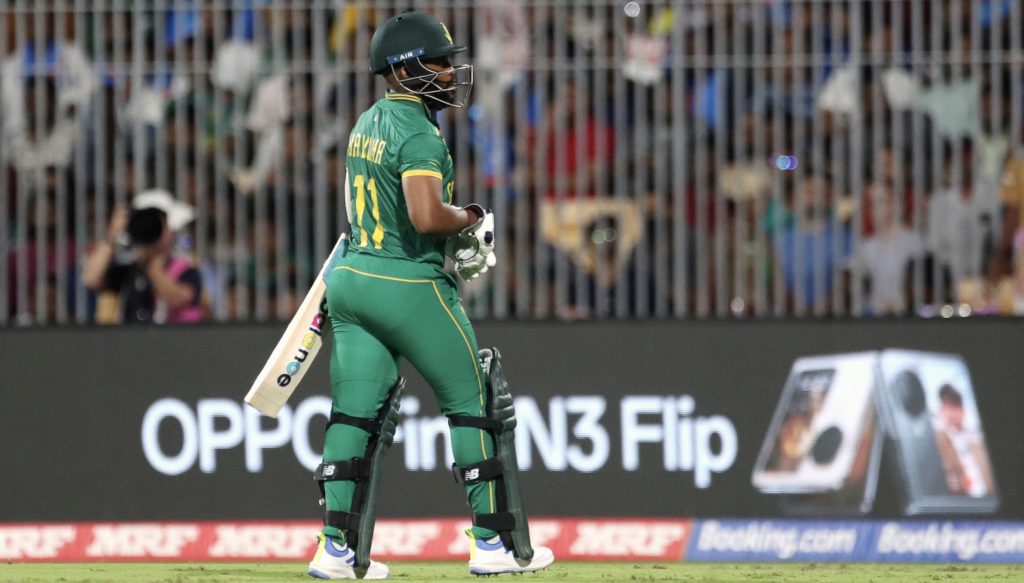Another World Cup, another struggle for Temba Bavuma. No cricket argument can be mounted in his defence, writes RYAN VREDE.
A year ago, Bavuma was in Australia as captain of a Proteas side stumbling through the T20 World Cup. Then, as now, he made no significant contributions with the bat.
His ongoing selection was widely questioned, but the selectors, headed by the now-fired Victor Mpitsang, held firm. Bavuma, who scored just 70 runs in five innings at the T20 World Cup, subsequently led the team to an exit at the hands of the Netherlands.
There was no justification for his retention then, and there isn’t now. Bavuma averages just over 20 in six ODI World Cup innings, with a highest score of 35.
Unlike the scenario in 2022, it was easy to support Bavuma when he struggled early in the current World Cup.
Back then he was exposed as woefully ill-equipped to open the batting in the T20 format well before the tournament started.
However, he averaged 71 in the 2023 calendar year coming into the ODI World Cup. There was a reference point for excellent form, which one hoped he’d recover as the tournament reached deeper.
But that hasn’t happened. His teammates’ excellent form veiled his struggle. But that struggle was laid bare in Kolkata in a 243-run defeat to India on Sunday. And head coach Rob Walters, who has the final say on selection, has to be decisive in replacing him.
HIGHLIGHTS: India vs Proteas (2023 CWC)
No cricket argument can be mounted to justify Bavuma’s ongoing selection.
There is a highly competent alternative in Reeza Hendricks, who scored 85 against England earlier in the tournament.
Neither can Bavuma’s leadership be cited as a critical component of their challenge. In his illness-enforced absence against England and Bangladesh, Aiden Markram skippered the side to comprehensive victories. Furthermore, the side is laden with enough experience to supplement Bavuma’s absence.
Bavuma also made a clutch of tactical errors in their two defeats, against the Netherlands and India. The latter featured an incomprehensible persistence with Marco Jansen, who was being pelted in the powerplay.
Eventually, Keshav Maharaj was introduced and immediately struck to dismiss Shubman Gill. Maharaj strangled Shreyas Iyer and Virat Kohli thereafter, but the duo were allowed to pick off easy ones to boundary riders.
On commentary, Ricky Ponting was perplexed by this tactic, arguing that Bavuma should challenge the batters to hit over the infield against a ball that was often turning and bouncing wickedly.
Ultimately, the pair built a 134-run partnership that completely took the game away from the Proteas.
Bavuma’s tactical failure was further exposed by India introducing spin in the eighth over, which aided in significantly restricting the Proteas’ ability to score freely.
Ravindra Jadeja finished with five wickets, while Kuldeep Yadav took two, conceding just 1.35 runs per over in five bowled.
Walter, and CSA director of cricket Enoch Nkwe who empowered the head coach with full control of selections after Mpitsang’s dismissal earlier this year, must be decisive in their leadership on this matter.
Consistent performance should be the primary measure of any player. Any complexity in deliberation around this issue is being introduced by Walter and Nkwe. It is not complex, despite what they may tell themselves.
Walter’s impact since he took over must be praised. He made an ODI side on the brink of non-qualification for the ODI World Cup a formidable opponent. But he risks compromising his side’s potency with blind loyalty to a player who is clearly struggling and offering very little value to the cause.
REACTION: Proteas can beat India in semis – Walter
Photo: Pankaj Nangia/Gallo Images







